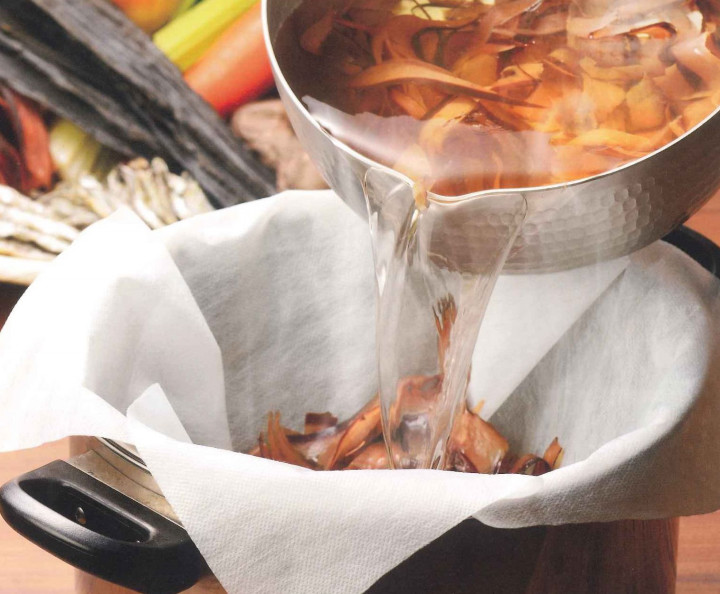Hello everyone, this is Mr. K, the editor of Gurutto Kitchen.
I am sorry for the long gap between my last post and this one.
I had been working on a plan for the next post, but I had to stop for a while!
The reason is that I came across a "theme" that I should deal with now!(exaggeration).
By the way, have you ever heard of this product?
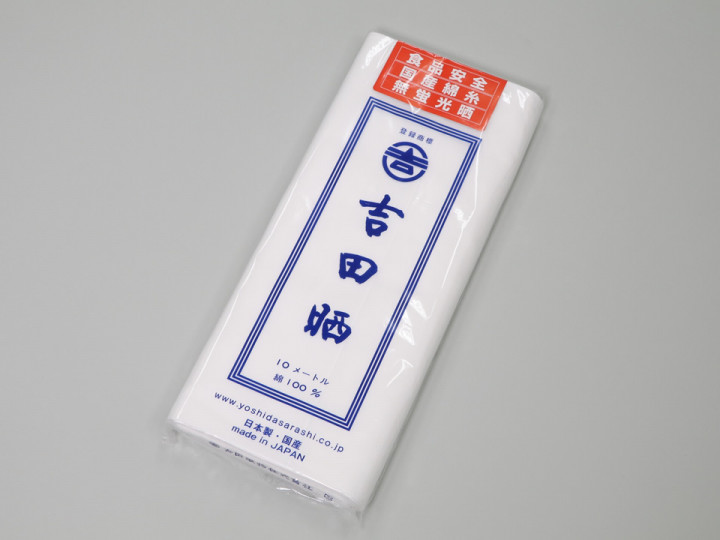
(Borrowed from the official website)
This is "Yoshida Sarashi®".
Yes, as the name suggests, it is bleaching.
There are many bleaching products in the world, but "Yoshida Sarashi®" is not like them.
We do not use fluorescent dyes, and our products are made of 100% cotton.
Made in Japan".
Fluorescent dye is not a word you are familiar with, is it?
Natural fibers are naturally yellowish white (this is called "nairi").
When they are sold as products, most of them are dyed to make the original white color look whiter!(Surprise!)
(Surprise!) Fluorescent dyes are used for this purpose.
However, the Food Sanitation Law prohibits the use of fluorescent dyes for food products, packaging materials in direct contact with food products, paper napkins, etc., and the Japanese Pharmacopoeia also does not permit the use of fluorescent dyes for non-fat cotton and gauze.
White is better for clothing and other fabrics, but what about when it comes to food?
What if those fibers were used in the food manufacturing process?
Just thinking about it makes you shudder 😢.
Therefore, we do not use any fluorescent dyes in the manufacturing process of "Yoshida Sarashi®"!
As proof of this, the Kaken Test Center's food sanitation inspection guidelines have confirmed that no fluorescent substances have been detected.
Therefore, this Yoshida Sarashi® is white with a slight yellowish tinge.
It is truly safe and secure!
We in the food service industry are very grateful for this.
Here is a company that manufactures and sells such a wonderful bleaching material.
Yoshida Orimono Co!
Ltd. handles not only Yoshida Sarashi® but also kitchen textile products for business use, towels, dyed fabrics, ritual goods, Nitto Boseki products, Mufan products, Unitika products, and Teijin products, which are widely sold to trading companies, government and municipal offices, various organizations, and general consumers.
Yoshida Orimono Co., Ltd. seems to be advocating something about the current situation of the textile industry and food manufacturing sites.(I'm curious.)
This story may have something to do with us...
If so, let's hear more about it directly!So, let's go to Yoshida Orimono Co.
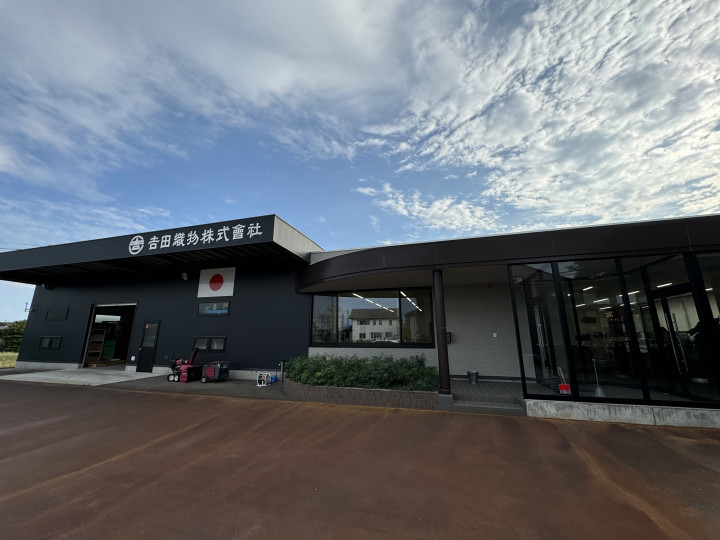
This is my first time here and it is a very beautiful company building.
This is the person we are going to talk to this time.
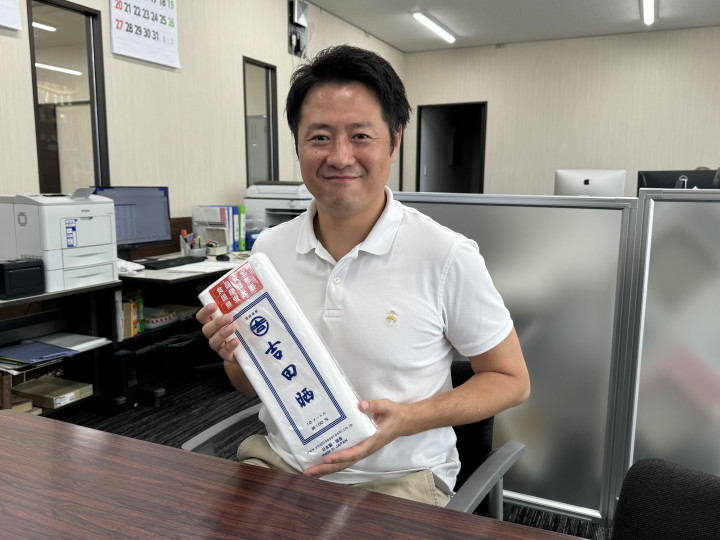
This is Mr. Kyuta Saito, Executive Director of Yoshida Orimono Co!(You have an early Yoshida Sarashi®, I usually call him Kyuta-san, so I will refer to him as Kyuta-san from now on).
Before we talk to him, he took us on a tour of the company.
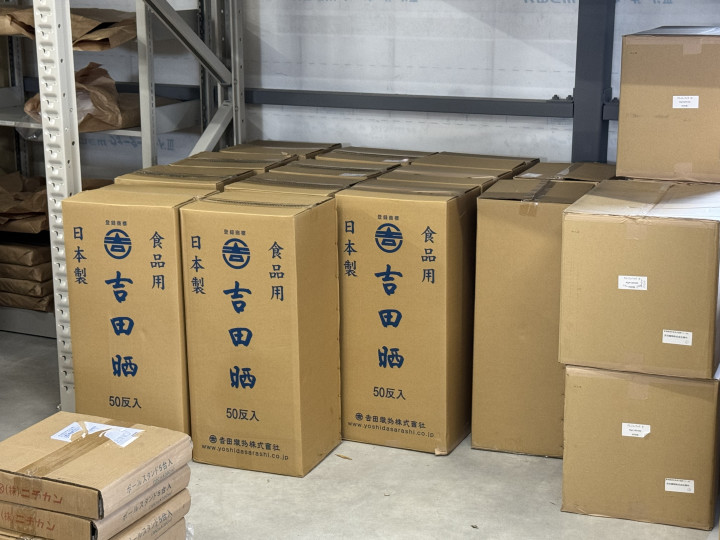
There it is, Yoshida Sarashi®, the one I usually see at work.
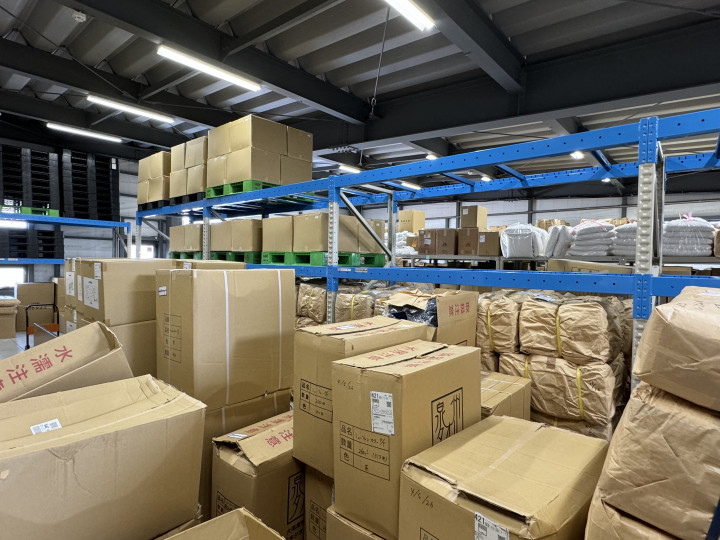
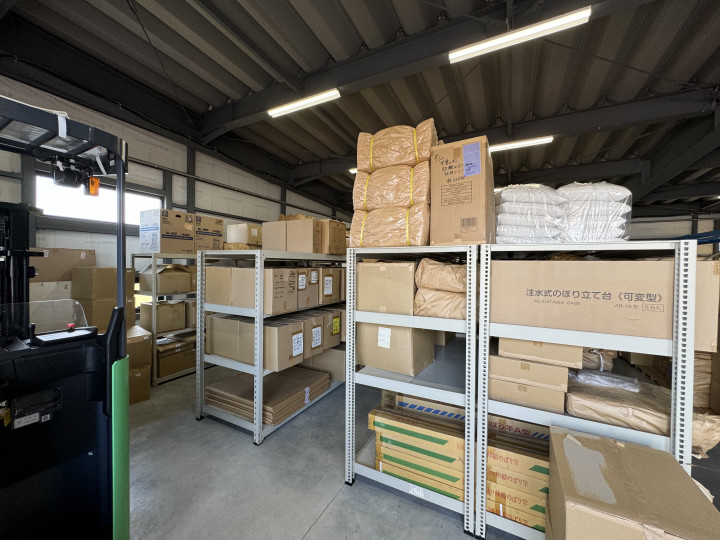
The warehouse is also neat and tidy (Kyuta san says there is still room for improvement).
And you also showed us the packing area (which I am personally very interested in).
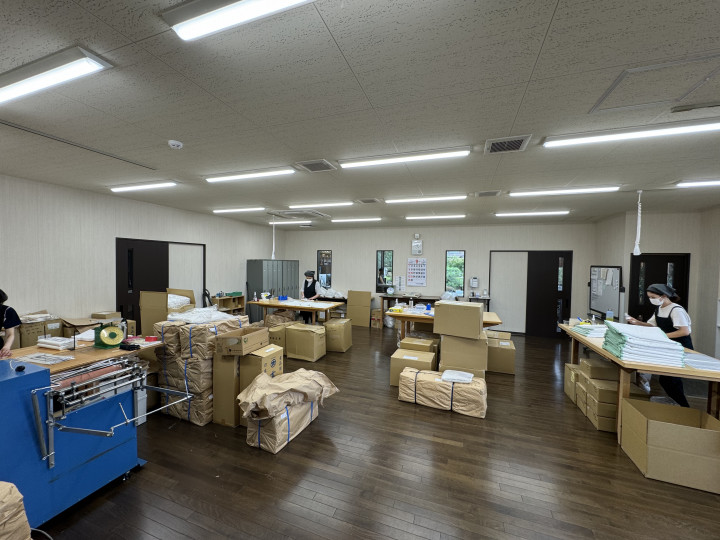
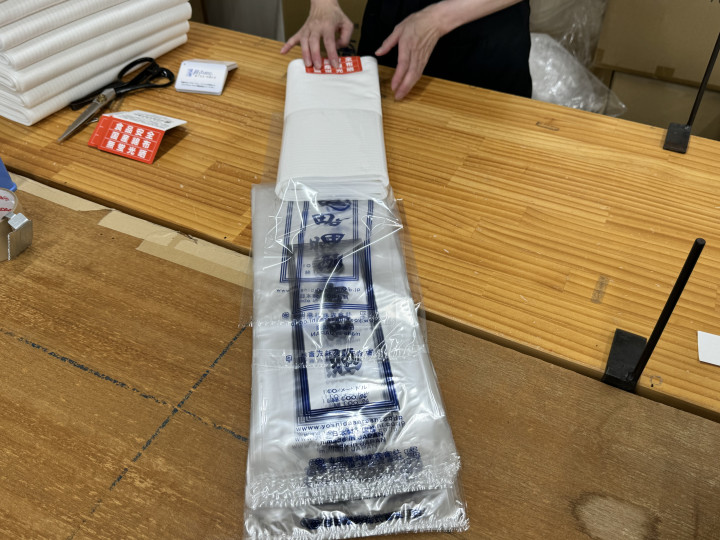
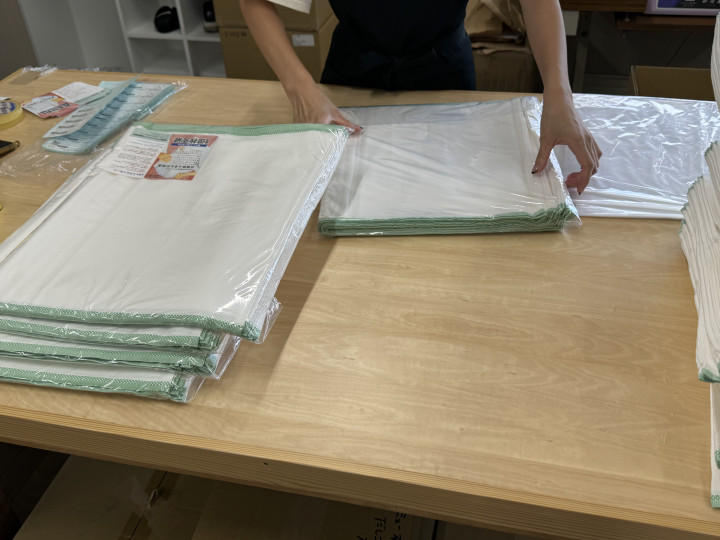
As you can see, everything is done by hand.
I saw that each piece was wrapped very carefully.
Even though I usually see the products at work, I could not believe that they were packaged by hand.
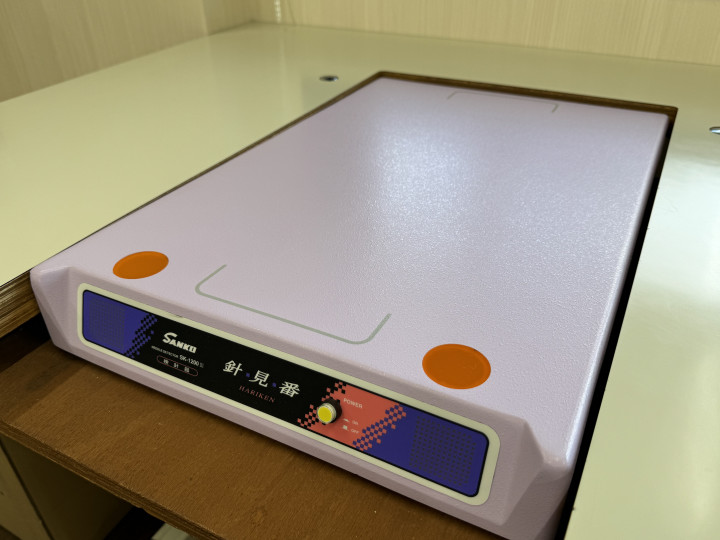
This is a metal finder, and this high-performance meter does not miss even the slightest foreign metal object!
Just by looking at this packaging place, you can see the high level of safety of this product!
Now that we have had a good look inside the company, it is time to interview Mr. Kyuta!
How that person was involved in the establishment of the factory!
----Thank you for taking time out of your busy schedule today.Please give me your best regards.
Thank you very much for taking time out of your busy schedule today.
Tsubame City is known for its metalworking industry, but was there also a thriving textile industry?
Kyuta: No, it was never really prosperous.However, the city has long been a production center of rice and bleached cotton.
Especially, "white cotton" was produced in the old days.Especially, "white cotton" flourished as a major industry in the former
It has continued to the present day.
Please tell us about the history of Yoshida Orimono at ----.
Kyuta: The company was founded in 1936.The company was founded in 1936 to manufacture bandages, gauze, and other sanitary materials for the Navy during the war.
The company was established as a manufacturer of bandages, gauze, and other sanitary materials for the Navy during the war.
Then, the famous "Admiral Isoroku Yamamoto" asked us to make "Sarashi" (bleaching) products,
The company established a large-scale factory in the style of a factory-based machine industry.
----- Is that Mr. Isoroku Yamamoto?
Kyuta: Yes, at that time, sanitary materials were a necessity for the treatment of war wounded.
The raw material, thread, was supplied by the Navy, and deliveries continued until the end of the war.
-----What happened after the war?
Kyuta: After the war, bleaching was still a necessity for households, so the business continued.
However, the times changed and in the 1990s, there was a bubble economy.
However, as time went on, in the 1990s, when the bubble economy burst, the demand for bleaching gradually declined.As the company was originally a government-supported company, we were forced to choose between "closing the company" and "going it on our own" as the government would no longer provide funding.
At that time, I looked to the neighboring town of Tsubame City, which is known for its metalworking kitchenware manufacturing.We felt that there was a need in this industry, and we found a way to "sell bleached fabrics to this industry," and we were able to continue the company on our own.
This was the start of the present Yoshida Orimono.This was more than 30 years ago.
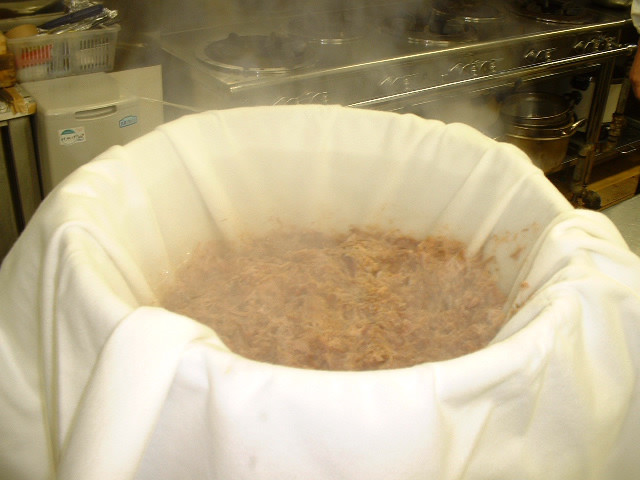
(Borrowed from the official website of the company)
---- So, that's how you connected with Ebematsu Shoji.
By the way, please tell us a little about Kyuta-san.
Kyuta: I went to a university in the Kanto area and spent my school days immersed in basketball.By the time I was 18, I had made up my mind to take over the company.
When my grandfather passed away and I saw the moment of succession, I thought, 'Let's do it.I thought it would be fun to take on the difficult challenge of selling a product like bleaching, a product that I wondered "Who uses it?
I tried job hunting for a consulting firm, but I felt that something was different about it and that I would not be able to connect with the company even if I joined.So I consulted with my father (the current president), who introduced me to an interesting company, and I found a job at a yukata manufacturer in Nihonbashi.There, I experienced everything from product planning, production management, and trade, not to mention sales.I had a vision of doing whatever I wanted at this company in the future, so I did not feel much resistance to it.
After spending my 20s there and gaining various experiences, I joined the company at the age of 31.
----- What do you think of the current environment surrounding the textile industry?
Kyuta: To be frank, I can't say it's very good.The industry itself has not been updated, and the recent sharp rise in raw material prices, labor shortages, and aging craftsmen are all contributing to a very bad environment.
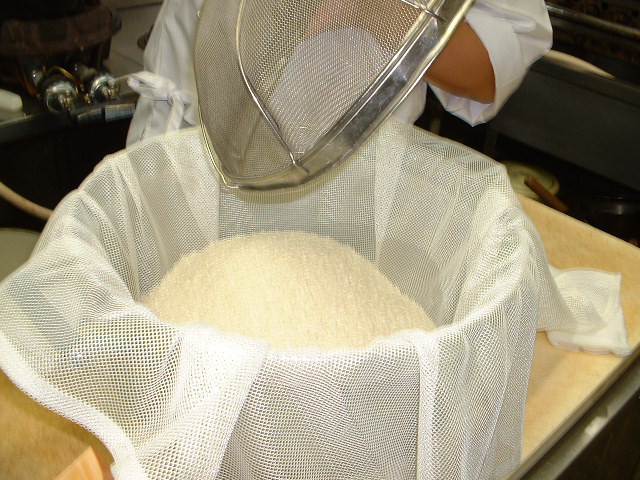
(Borrowed from the official website)
----- Some say it is a "declining industry"?
Kyuta: Yes, but this is the responsibility of the industry itself.
----- What do you mean?
Kyuta: We can't sell our products at a high price.
As a result of doing business at the very edge without demanding a price increase, they can't keep up with the prices and end up closing their business.
If they had demanded higher prices for the costs incurred, this would not have happened.I feel this is the case in the textile industry.
On the other hand, those who are aware of price increases seem to have momentum and continuity.
-----You must have many opportunities to visit various sites, but what do you feel each time you do?Also, do you get inquiries directly from users?
Kuta: My sense is that it is more often from users.I think there is a reason for that, and perhaps they have decided that the vendor in between cannot solve their problem, and they are contacting us directly.
How do those users reach Yoshida Orimono at ------?
Kyuta: The website.Everyone is looking for it by themselves.In fact, when we talked to them, they said it took them several months to get there.
------ What type of business do you receive many inquiries from?
Kyuta: Many of them are in the food industry.And they all say that they don't know how to do the "filtration work.
----- I heard that there are a lot of inquiries from food factories and central kitchens these days.
Kyuta: This is just my personal opinion, but I think it is becoming more and more difficult to make products on site at restaurants.Simply put, there is a shortage of labor.
I imagine that people talk to food factories to ask them to make such things, but the important food factories say, "We've never done such a thing before," and then they contact me.
I imagine that the food factories would then contact me, saying, "We've never done such a thing before.I would imagine that the first step would be to consult with materials suppliers.
However, the reality is that these filters and nets are actually used in the food industry.The situation is very dangerous, to say the least, because the people in charge at the department level do not know if what they are using is safe or not.
-----What can we at Ebematsu Trading do there?
Kyuta: I can offer the know-how I have accumulated at Cutting Edge.On the other hand, I don't think it is necessary for EBEMATSU, which handles 90,000 items, to put every one of those individual projects into its know-how.
I think that if we become more visible that we are a company that can do a variety of things, we will receive more inquiries from our partners.This will naturally lead to a connection with us.
For example, "We provide total food consulting services.
What does EBEMATSU SHOJI do?I hope to see branding that will make it immediately clear what EBEMATSU SHOJI does.
I also have the impression that other companies in the same industry are more directly involved with users.Therefore, we receive inquiries immediately, and we can immediately move forward and conclude business negotiations.
However, it is very difficult for EBEMATSU to do so.It is difficult for EBEMATSU, however, because of its business distribution system.
If you are going to approach food factories and central kitchens in the future, the question is what channels you should use⁉.
This is a part I cannot go into, but as I have mentioned, there are indeed people in need, and they do not know what to do onsite.This is the "blue ocean!
I always thought it was a waste not to be involved in that market.
In this age of 2025, perhaps it is time for a change.This is what I think of Tsubame City's industry as a whole.
I feel that we are only moving in areas that we can see, and we are not going into areas that we don't understand.
I think that just responding to what comes along is probably not going to be enough from now on.The times are sure to shrink in the future.
The textile industry has experienced this one step ahead of us.
We are the ones who have changed.
I believe that the same thing will happen in the metalworking industry.
If we don't have the awareness to change and change ourselves in this situation, I think we will see the same scenery that we experienced 30 years ago.
-----Maybe what you just said is the answer to my last question, but I dare to ask.
What do you envision for the future, Mr. Kyuta?
Kyuta: What we deal with as a company may be primitive or old-fashioned, but what we do is committed to what the times demand, and I want to make sure that this is conveyed to the public.
We want to be a company that communicates that we are committed to what the times demand.
But we are only one piece of the puzzle.
I hope that everyone can change this and make it a local industry that will lead to the future.
Because this is a town with so much manufacturing potential.(End).
So, I visited Yoshida Orimono and asked them about their business.
I could understand the current severe situation of the textile industry.
However, Mr. Yoshida Orimono was not succumbing to it, but was struggling while challenging new things.
Textiles and metals are completely different from each other, but they are in fact closely related in the big field of "food.
Kuta-san is concerned about the future of metalworking.
But perhaps that is also because he wants to help boost Tsubame City's local industry together.
To be honest, some of what he said was painful to hear, but I am sure that there are things that EBEMATSU SHOJI can do and should do!I felt that there are things that EBEMATSU SHOJI can and should do.
There are certainly many issues that need to be addressed, and it is not an easy task, but this interview gave me a hint for further growth as a company.
Anyway, to everyone involved in the "food" industry, from our sales partners to our users, I would like to express my sincere gratitude for your support,
We at Ebematsu Shoji are your reliable and safe channel to Yoshida Orimono!
Please do not hesitate to contact us for any problems you may have, even if they are trivial!


